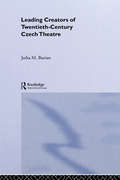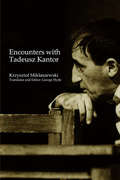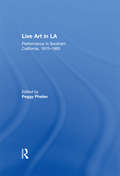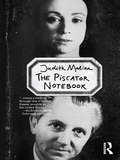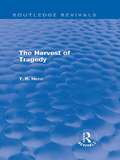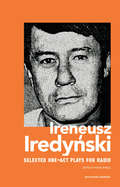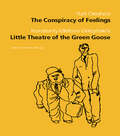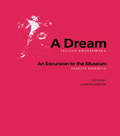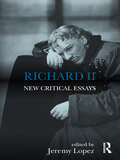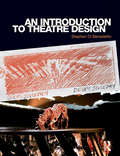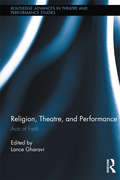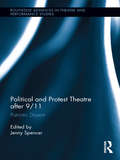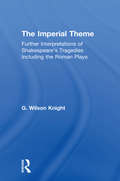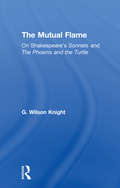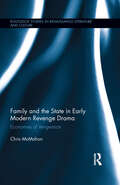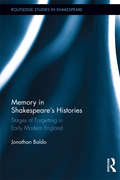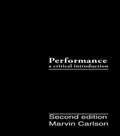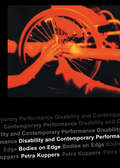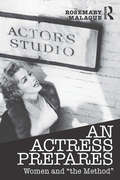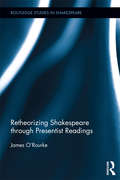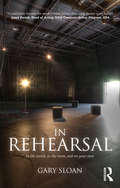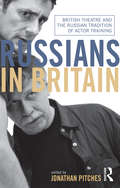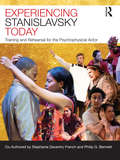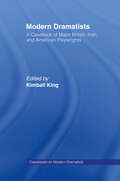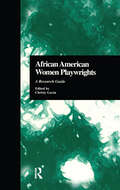- Table View
- List View
Leading Creators of Twentieth-Century Czech Theatre (Routledge Harwood Polish And East European Theatre Archive Ser. #Vol. 7)
by Jarka M. BurianIn this invaluable and detailed presentation of the leading creative figures in a richly innovative and dynamic period of Czech theatre, Professor Jarka M. Burian provides us with insightful portraits of the directors K. H. Hilar, E. F. Burian, Alfred Radok, and Otomar Krejca: of the famous Voskovec and Werich comedic duo; of the scenographer Josef Svoboda; and of the playwright, now President of the Czech Republic, Václav Havel. There are also briefer studies of numerous other directors, designers, and actors. The author, a Czech-American theatre scholar and practitioner, has been a frequent on-site observer of Czech theatre since 1965. He is directly acquainted with many of the major artists and the most notable productions that have made Czech theatre internationally famous.
Encounters with Tadeusz Kantor (Routledge Harwood Polish And East European Theatre Archive Ser.)
by Krzysztof MiklaszewskiAn invaluable collection of documents and discussions of the work of one of the most significant theatre practitioners of the last fifty years.This unique set of reminiscences, written by one of the actors who worked closely with Kantor over a long period of time, ranges from the anecdotal to the theoretical. Kantor's work offers some of the most disconcerting allegories of Modernism and a quintessential expression of the unconscious during a bitter period of human history. Kantor's stern but affectionate guardianship of his troupe of travelling players comes off Miklaszewski's pages with warmth, humanity and humour.
Live Art in LA: Performance in Southern California, 1970 - 1983
by Peggy PhelanLive Art in LA: Performance Art in Southern California , 1970-1983 documents and critically examines one of the most fecund periods in the history of live art. The book forms part of the Getty Institute’s Pacific Standard Time initiative – a series of exhibitions, performance re-enactments and research projects focused on the greater Los Angeles area. This extraordinary volume, beautifully edited by one of the leading scholars in the field, makes vivid the compelling drama of performance history on the west coast. Live Art in LA: moves lucidly between discussions of legendary figures such as Judy Chicago and Chris Burden, and the crucial work of less-celebrated solo artists and collectives; examines the influence of key institutions, particularly Los Angeles Contemporary Exhibitions and the California Institute of the Arts – and the Feminist Art Programme established at the latter; features original and incisive essays by Peggy Phelan and Amelia Jones, and eloquent contributions by Michael Ned Holte, Suzanne Lacy and Jennifer Flores Sternad. Combining cutting-edge research with over 100 challenging and provocative photographs and video stills, Live Art in LA represents a major re-evaluation of a crucial moment in performance history. And, as performance studies becomes ever more relevant to the history of art, promises to become a vital and enduring resource for students, academics and artists alike.
The Piscator Notebook
by Judith Malina'Theater legend Malina has written one of the most interesting studies of the avant-garde theatrical movement published in the last several years.' – CHOICE Judith Malina and The Living Theatre have been icons of political theatre for over six decades. What few realise is that she originally studied under one of the giants of twentieth century culture, Erwin Piscator, in his Dramatic Workshop at The New School in New York. Piscator founded the Workshop after emigrating to New York, having collaborated with Brecht to create "epic theatre" in Germany. The Piscator Notebook documents Malina’s intensive and idiosyncratic training at Piscator’s school. Part diary, part theatrical treatise, this unique and inspiring volume combines: complete transcriptions of Malina’s diaries from her time as a student at the Dramatic Workshop, as well as reproductions of various of Piscator’s syllabi and teaching materials; notes on Malina’s teachers, fellow students – including Marlon Brando and Tennessee Williams – and New School productions; studies of Piscator’s process and influence, along with a new essay on the relationship between his teaching, Malina’s work with the Living Theatre and "The Ongoing Epic"; an introduction by performance pioneer, Richard Schechner. The Piscator Notebook is a compelling record of the genealogy of political theatre practice in the early 20th Century, from Europe to the US. But it is also a stunningly personal reflection on the pleasures and challenges of learning about theatre, charged with essential insights for the student and teacher, actor and director. 'Piscator is the greatest theatre man of our time.' – Bertolt Brecht
The Harvest of Tragedy (Routledge Revivals)
by Thomas Rice HennUpon initial publication in 1956, this book was an attempt to re-state certain problems concerning the aesthetics and ethics of the tragic form; to examine these in relation to contemporary work in psychology and anthropology; to enquire into the significance of ‘the fact or experience called tragedy’ in the modern world; and to suggest a synthesis in terms of the Christian tradition. This is a reissue of the corrected second edition of the work, first published in 1966.
Ireneusz Iredynski: Selected One-Act Plays for Radio
by Kevin WindleThis vibrant anthology of radio plays features works by one of Poland's 'angry young men' playwrights. Ireneusz Iredynski made his début in literature as a Polish 'angry young man' in the late 1950s. He moved with great versatility from verse to stage plays, film-scripts and plays for radio. While some of the plays in this collection seem to present a bleak view of life, they show a gentler side of Iredynski. Here it is people's dreams rather than their worst nightmares that are explored. In these plays, situations are kept simple and the theatrical technique is spare and economical, but yet, the playwright demonstrates an unfailing theatrical flair and shows himself a master of dramatic tension and the final unexpected twist.
The Conspiracy of Feelings and The Little Theatre of the Green Goose
by Yurii Olesha Konstanty Ildefons GałczyńskiTwo outstanding examples of socialist-themed plays are combined in this remarkable volume. The Conspiracy of Feelings by Yurii Olesha (1899-1960) is based on his highly respected short novel Envy about the struggle between the old and new in Soviet society. The play, called The Conspiracy of Feelings, is not a simple adaptation, but an original work that reconceived the novel. The play explores the precarious position of the intelligentsia in the new collective state. The Little Theatre of The Green Goose was written by Konstanty Ildefons Galczynski (1905-53) who was one of Poland's most beloved poets. After World War II, he began work as a playwright, inventing a colorful theatre troupe of performers (animal and human) and contributing a new instalment of The Little Theatre of the Green Goose each week to Przekroj, the Cracow literary magazine. Intended for reading only, The Green Goose went unperformed in Galczynski's life and was finally staged in 1955 and gained a permanent place in the theatre and became a force for the creation of the new Polish drama that flourished in the 1960s.
A Dream
by Felicja KruszewskaThe translation of Felicja Kruszewska's A Dream introduces a major play by a twentieth-century female playwright to the English-speaking world. On March 7, 1927 A Dream - a large-scale expressionistic drama by an unknown poet - burst on the Polish theatrical scene in a dazzling debut production by the young actor Edmund Wiercinski, who would become one of the outstanding directors of his time. The play's hallucinatory visions of the rise of fascism and the heroine's longing for a providential savior on a white horse spoke directly to Polish audiences about their deepest anxieties. During the next two years A Dream received three additional stagings and became the subject of lively debate and controversy. The play, which has been successfully revived in 1974, is an outstanding example of European expressionism. The volume also contains An Excursion to the Museum, by the contemporary Polish poet, playwright, and short-story writer Tadeusz Rozewicz. A disturbing account of an utterly mundane visit to Auschwitz, the tale is a brilliant example of the playwright's technique of poetic collage.
Richard II: New Critical Essays (Shakespeare Criticism)
by Jeremy LopezArguably the first play in a Shakespearean tetralogy, Richard II is a unique and compelling political drama whose themes still resonate today. It is one of the few Shakespeare plays written entirely in verse and its format presents unique theatrical challenges. Politically engaged and controversial, it raises crucial debates about the relationship between early modern art, audience response and state power. This collection provides a comprehensive and up-to-date survey of the critical and theatrical history of the play. The substantial introduction surveys the history of critical interpretations of Richard II since the eighteenth century. The eleven newly written critical essays by leading and emerging scholars in the field then adopt an eclectic range of critical approaches that encourage scholars and students to pursue new and imaginative directions with the text.
An Introduction to Theatre Design
by Stephen Di BenedettoThis introduction to theatre design explains the theories, strategies, and tools of practical design work for the undergraduate student. Through its numerous illustrated case studies and analysis of key terms, students will build an understanding of the design process and be able to: identify the fundamentals of theatre design and scenography recognize the role of individual design areas such as scenery, costume, lighting and sound develop both conceptual and analytical thinking Communicate their own understanding of complex design work trace the traditions of stage design, from Sebastiano Serlio to Julie Taymor. Demonstrating the dynamics of good design through the work of influential designers, Stephen Di Benedetto also looks in depth at script analysis, stylistic considerations and the importance of collaboration to the designer's craft. This is an essential guide for students and teachers of theatre design. Readers will form not only a strong ability to explain and understand the process of design, but also the basic skills required to conceive and realise designs of their own.
Religion, Theatre, and Performance: Acts of Faith (Routledge Advances in Theatre & Performance Studies)
by Lance GharaviThe intersections of religion, politics, and performance form the loci of many of the most serious issues facing the world today, sites where some of the world’s most pressing and momentous events are contested and played out. That this circumstance warrants continued, thoughtful, and imaginative engagement from those within the fields of theatre and performance is one of the guiding principles of this volume. This collection features a diverse set of perspectives, written by some of the top scholars in the relevant fields, on the many modern intersections of religion with theatre and performance. Contributors argue that religion can no longer be conceived of as a cultural phenomenon that is safely sequestered in the "private sphere." It is instead an explicitly public force that stimulates and complicates public actions, and thus a crucial component of much performance. From mystic theologies of acting to the neuroscience of spirituality in rituals to the performance of secularism, these essays address a broad variety of religious traditions, sharing a common conception of religion as a crucial object of discourse—one that is formed by, and significantly formative of, performance.
Political and Protest Theatre after 9/11: Patriotic Dissent (Routledge Advances in Theatre & Performance Studies)
by Jenny SpencerThis collection documents and examines political and protest theatre produced between the 9/11 attacks in 2001 and Obama’s election in 2008 by British and American artists responding to their own governments’ actions and policies during this time. The plays take up topics such as the ongoing wars on terror, Blair’s support of U.S. policies, the flawed intelligence that led to the Iraq war, and illegal detentions and torture at Abu Ghraib. The authors argue that engaged artists faced a radically different sociopolitical context for their work after 9/11 compared to earlier social protest movements and new forms of theatre, and different emotional strategies were necessary to meet the challenges. The subtitle Patriotic Dissent suggests the double stance of many artists-- influenced by patriotic expressions of national solidarity, yet critical of the ways that patriotic language was put to use against others. The articles represent a broad range of theatre: Broadway musicals, documentary theatre, adaptations of classical theatre, new plays by British playwrights, street performances and installations, and musical concerts. The contributors’ case studies evaluate the effectiveness of important instances of political theatre and protest from this decade, arguing for the significance, relevance, and continuing necessity for evolving forms of political theatre today.
Imperial Theme - Wilson Knight: Further Interpretations Of Shakespeare's Tragedies Including The Roman Play
by G. Wilson KnightFirst Published in 2002. Routledge is an imprint of Taylor & Francis, an informa company.
Mutual Flame - Wilson Knight V: On Shakespeare's Sonnets And The Phoenix And The Turtle
by Wilson KnightFirst Published in 2002. Routledge is an imprint of Taylor & Francis, an informa company.
Family and the State in Early Modern Revenge Drama: Economies of Vengeance (Routledge Studies in Renaissance Literature and Culture)
by Chris McMahonIn this book, McMahon considers Early Modern revenge plays from a political science perspective, paying particular attention to the construction of family and state institutions. Plays set for close study are The Spanish Tragedy, Hamlet, The Revenger’s Tragedy, The Malcontent and The Duchess of Malfi. The plays are read as unique events occupying positions in historical process concerning the privatisation of the family (by means of symbolism and concrete household strategies such as budgeting and surveillance) and the subsequent appropriation of the family and its methods by the state. The effect is that family becomes an unofficial organ of the state. This process, however, also involves the reform of the state along lines demanded by the private family. McMahon’s critical method, derived from the theory of Bourdieu, Bataille, and Girard, maps capital transactions to reveal emotionally charged, often idiosyncratic responses to issues of shared concern. Such issues include state corruption, the management of women, the performance of roles according to gender, the uses of surveillance, and the ethics of sacrifice.
Memory in Shakespeare's Histories: Stages of Forgetting in Early Modern England (Routledge Studies in Shakespeare)
by Jonathan BaldoA distinguishing feature of Shakespeare’s later histories is the prominent role he assigns to the need to forget. This book explore the ways in which Shakespeare expanded the role of forgetting in histories from King John to Henry V, as England contended with what were perceived to be traumatic breaks in its history and in the fashioning of a sense of nationhood. For plays ostensibly designed to recover the past and make it available to the present, they devote remarkable attention to the ways in which states and individuals alike passively neglect or actively suppress the past and rewrite history. Two broad and related historical developments caused remembering and forgetting to occupy increasingly prominent and equivocal positions in Shakespeare’s history plays: an emergent nationalism and the Protestant Reformation. A growth in England’s sense of national identity, constructed largely in opposition to international Catholicism, caused historical memory to appear a threat as well as a support to the sense of unity. The Reformation caused many Elizabethans to experience a rupture between their present and their Catholic past, a condition that is reflected repeatedly in the history plays, where the desire to forget becomes implicated with traumatic loss. Both of these historical shifts resulted in considerable fluidity and uncertainty in the values attached to historical memory and forgetting. Shakespeare’s histories, in short, become increasingly equivocal about the value of their own acts of recovery and recollection.
Performance: A Critical Introduction
by Marvin CarlsonThis comprehensively revised, illustrated edition discusses recent performance work and takes into consideration changes that have taken place since the book's original publication in 1996. Marvin Carlson guides the reader through the contested definition of performance as a theatrical activity and the myriad ways in which performance has been interpreted by ethnographers, anthropologists, linguists, and cultural theorists. Topics covered include: *the evolution of performance art since the 1960s *the relationship between performance, postmodernism, the politics of identity, and current cultural studies *the recent theoretical developments in the study of performance in the fields of anthropology, psychoanalysis, linguistics, and technology. With a fully updated bibliography and additional glossary of terms, students of performance studies, visual and performing arts or theatre history will welcome this new version of a classic text.
Disability and Contemporary Performance: Bodies on the Edge
by Petra KuppersDisability and Contemporary Performance presents a remarkable challenge to existing assumptions about disability and artistic practice. In particular, it explores where cultural knowledge about disability leaves off, and the lived experience of difference begins. Petra Kuppers, herself an award-winning artist and theorist, investigates the ways in which disabled performers challenge, change and work with current stereotypes through their work. She explores freak show fantasies and 'medical theatre' as well as live art, webwork, theatre, dance, photography and installations, to cast an entirely new light on contemporary identity politics and aesthetics. This is an outstanding exploration of some of the most pressing issues in performance, cultural and disability studies today, written by a leading practitioner and critic.
An Actress Prepares: Women and "the Method"
by Rosemary Malague'Every day, thousands of women enter acting classes where most of them will receive some variation on the Stanislavsky-based training that has now been taught in the U.S. for nearly ninety years. Yet relatively little feminist consideration has been given to the experience of the student actress: What happens to women in Method actor training?' An Actress Prepares is the first book to interrogate Method acting from a specifically feminist perspective. Rose Malague addresses "the Method" not only with much-needed critical distance, but also the crucial insider's view of a trained actor. Case studies examine the preeminent American teachers who popularized and transformed elements of Stanislavsky’s System within the U.S.—Strasberg, Adler, Meisner, and Hagen— by analyzing and comparing their related but distinctly different approaches. This book confronts the sexism that still exists in actor training and exposes the gender biases embedded within the Method itself. Its in-depth examination of these Stanislavskian techniques seeks to reclaim Method acting from its patriarchal practices and to empower women who act. 'I've been waiting for someone to write this book for years: a thorough-going analysis and reconsideration of American approaches to Stanislavsky from a feminist perspective ... lively, intelligent, and engaging.' – Phillip Zarrilli, University of Exeter 'Theatre people of any gender will be transformed by Rose Malague’s eye-opening study An Actress Prepares... This book will be useful to all scholars and practitioners determined to make gender equity central to how they hone their craft and their thinking.' – Jill Dolan, Princeton University
Retheorizing Shakespeare through Presentist Readings (Routledge Studies in Shakespeare)
by James O'RourkeThis book offers a theoretical rationale for the emerging presentist movement in Shakespeare studies and goes on to show, in a series of close readings, that a presentist Shakespeare is not an anachronism. Relying on a Brechtian aesthetic of "naïve surrealism" as the performative model of the early modern, urban, public theater, James O’Rourke demonstrates how this Brechtian model is able to capture the full range of interplays that could take place between Shakespeare’s words, the nonillusionist performance devices of the early modern stage, and the live audiences that shared the physical space of the theatre with Shakespeare’s actors. O’Rourke argues that the limitations placed upon the critical energies of early modern drama by the influential new historicist paradigm of contained subversion is based on a poetics of the sublime, which misrepresents the performative aesthetic of the theater as a self-sufficient spectacle that compels reception in its own terms. Reimagining Shakespeare as our contemporary, O’Rourke shows how the immanent critical logic of Shakespeare’s works can enter into dialogue with our most sophisticated critiques of our cultural fictions.
In Rehearsal: In the World, in the Room, and On Your Own
by Gary SloanIn Rehearsal is a clear and accessible how-to approach to the rehearsal process. Author Gary Sloan brings more than thirty years' worth of acting experience to bear on the question of how to rehearse both as an individual actor and as part of the team of professionals that underpins any successful production. Interviews with acclaimed actors, directors, playwrights, and designers share a wealth of knowledge on dynamic collaboration. The book is divided in to three main stages, helping the reader to refine their craft in as straightforward and accessible manner as possible: In the world: A flexible rehearsal program that can be employed daily, as well as over a typical four week production rehearsal. In the room: Advice on working independently and productively with other members of a company, such as directors, playwrights, designers and technical crew; how your personal creative process varies depending on the role, be it Shakespeare, musicals, film, television or understudying. On your own: Creating your own rehearsal process, exploring original and famous rehearsal techniques, breaking through actor's block and how to practice every day. In Rehearsal breaks down the rehearsal process from the actor’s perspective and equips its reader with the tools to become a generous and resourceful performer both inside and outside the studio. Its independent, creative and daily rehearsal techniques are essential for any modern actor.
Russians in Britain: British Theatre and the Russian Tradition of Actor Training
by Jonathan PitchesFrom Komisarjevsky in the 1920s, to Cheek by Jowl’s Russian ‘sister company’ almost a century later, Russian actor training has had a unique influence on modern British theatre. Russians in Britain, edited by Jonathan Pitches, is the first work of its type to identify a relationship between both countries’ theatrical traditions as continuous as it is complex. Unravelling new strands of transmission and translation linking the great Russian émigré practitioners to the second and third generation artists who responded to their ideas, Russians in Britain takes in: Komisarjevsky and the British theatre establishment. Stanislavsky in the British conservatoire. Meyerhold in the academy. Michael Chekhov in the private studio. Littlewood’s Theatre Workshop and the Northern Stage Ensemble. Katie Mitchell, Declan Donnellan and Michael Boyd. Charting a hitherto untold story with historical and contemporary implications, these nine essays present a compelling alternative history of theatrical practice in the UK.
Experiencing Stanislavsky Today: Training and Rehearsal for the Psychophysical Actor
by Stephanie Daventry French Philip G. BennettThis pioneering introduction to Stanislavsky's methods and modes of actor training covers all of the essential elements of his System. Recreating 'truthful' behaviour in the artificial environment, awareness and observation, psychophysical work, given circumstances, visualization and imagination, and active analysis are all introduced and explored. Each section of the book is accompanied by individual and group exercises, forming a full course of study in the foundations of modern acting. A glossary explains the key terms and concepts that are central to Stanislavsky's thinking at a glance. The book's companion website is full of downloadable worksheets and resources for teachers and students. Experiencing Stanislavsky Today is enhanced by contemporary findings in psychology, neuroscience, anatomy and physiology that illuminate the human processes important to actors, such as voice and speech, creativity, mind-body connection, the process and the production of emotions on cue. It is the definitive first step for anyone encountering Stanislavsky's work, from acting students exploring his methods for the first time, to directors looking for effective rehearsal tools and teachers mapping out degree classes.
Modern Dramatists: A Casebook of Major British, Irish, and American Playwrights (Studies in Modern Drama #Vol. 14)
by Kimball KingThis comprehensive collection gathers critical essays on the major works of the foremost American and British playwrights of the 20th century, written by leading figures in drama/performance studies.
African American Women Playwrights: A Research Guide (Critical Studies in Black Life and Culture #31)
by Christy GavinFirst Published in 1999. Routledge is an imprint of Taylor & Francis, an informa company.
